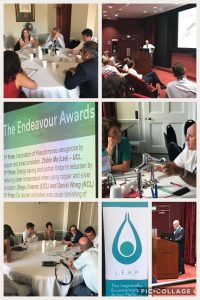This is guest blogger, Dr Vera Barbosa’s account of the 4th edition of the Legionella and Environmental Action Platform (LEAP).
This is one of my favourite events I attend each year! I have attended LEAP 2 and 3 held in a lovely rural setting near Milton Keynes and the venue for LEAP 4 in Belgravia, London, did not disappoint!
This year’s event included presentations as well as table discussions. The Society of Chemical Industry (SCI) auditorium was comfortable, with great audio visual resources and it was just the right size for the event.
The first presentation by Dr Mark Garvey, Principal Clinical Scientist in Infection Control for the University Hospitals Birmingham NHS Trust, was entitled Legionella as an emerging pathogen in the water systems of healthcare establishments. He gave an overview of Legionella and Pseudomonas risks and how to deal with them. He pointed out that holistic factors, as well as engineering, are necessary. He concluded that “we’ll never get rid of everything” and that water sampling is key and so is Water Safety Group.
The second presentation by Dr John Cunniffe, Head of the Dept of Medical Microbiology, Wirral University Teaching Hospital, was entitled ‘Pseudomonas – getting to know your enemies’ was everything you want from a conference presentation, i.e. entertaining, informative and relevant. Dr Cunniffe gave a background to the Society of Chemical Industry which he managed to link to the subject of his presentation, which included interesting facts about Pasteur, Darwin, and even Donald Trump. If you ever have an opportunity to attend a
presentation by Dr Cunniffe, do it and you won’t regret it! He concluded that P. Aeruginosa is a very clever organism; it evolved to survive in any environment and can survive in hydrocarbon. It can resistant a large list of antibiotics.
Other presentations comprised:
Dr Birgitta Bedford, Technical Director for ProEconomy, who did a presentation on biofilms and how to control them in water systems.
Dr Elaine Cloutman-Green, Principal Clinical Scientist, Great Ormond Street Hospital, did a very entertaining presentation on assessment – where, when and how. Her take home message was communication is key. She mentioned cake in a couple of occasions, too.
Prof Clive Thompson, from ALS laboratories, presented on the need for a sampling protocol.
Peter Holland, from Atherleigh Park, presented a case study which showed the challenges in taking a building site to a live building in a healthcare environment. His final message was ‘plan ahead and have a contingency plan.’
John Murray, the Compliance Manager for Sodexo UK, did another entertaining presentation on compliance. He said the LEAP attendees should form a knowledge group, considering all the knowledge in the room. I agree!
The results of the UCL/ProEconomy Copper-Silver Ionisation collaboration project were presented at the event by the MSc students’ supervisor Dr Lena Ciric (Lecturer in Environmental Engineering, Environmental Systems Engineering MSc Programme Director, University College London). The projects were on the performance of copper and silver ionisation for the prevention of biofilms formation, disruption of mature biofilms, inactivation of Pseudomonas, the cause of ceramic staining and metal instruments tarnishing and the how it might reduce carbon emissions. The results for biofilm were inconclusive and need further investigation, but the other results showed that staining of ceramics and tarnishing of metal equipment was due to water chemistry and not copper-silver ionisation. A significant decrease (>82%) in P. aeruginosa was also shown.
Byron Bedford, Managing Director for ProEconomy, did a presentation on how to control pathogen in water systems using copper and silver ionisation. He also announced the winners of the Endeavour Awards and the winning projects were: 1st place for the Pseudomonas project carried out by Ma Zhibin from UCL; 2nd place for the carbon emissions reduction project by Diego Jimenez from UCL and Daniel Wang from KCL; and 3rd place went to the tarnishing of medical equipment project. I was involved in the project’s coordination and was very proud of all students for their hard work with the projects.
LEAP is a not-for-profit event and this year’s beneficiary charity was Caminos de Agua, which is a charity that promotes rainwater harvesting ensuring rural communities in Central America, including Mexico, Honduras, and the Dominican Republic, have access to safe water for their families.
The unique L.E.A.P. format of table sessions also took place in the afternoon. The discussions going on in the five tables were:
A practical look at fixtures and fittings, led by John Murray and Dr Birgitta Bedford.
Pseudomonas, led by Dr Elaine Cloutman-Green and Dr John Cunniffe.
Legionella and hospital acquired infections led by Claire Hennessey and Dr Mark Garvey.
Chemical and Microbial Analysis, led by Prof Clive Thompson and Bjorn Nielson.
Another great event from LEAP! Looking forward to the 2018 event already!
Dr V Barbosa is a consultant research scientist, specializing in water treatment and pollution control.

